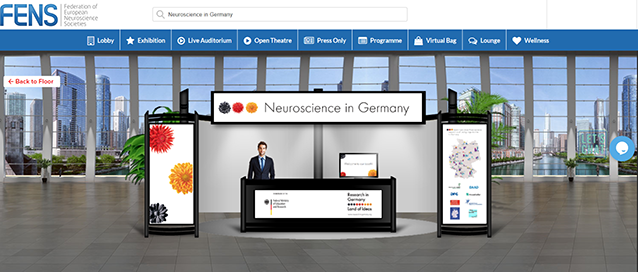First virtual joint Research in Germany appearance at the Federation of European Neuroscience Societies (FENS) Virtual Forum
(22.07.20) It was supposed to be a summer event in Glasgow, Scotland. The former industrial city and the United Kingdom’s third largest city was meant to be the destination for countless neuroscientists from Europe and other parts of the world. However, the outbreak of the coronavirus pandemic changed everything. The organisers of the British Neuroscience Association (BNA) decided early on to convert the conference of European neuroscience societies into a virtual event. Instead of meeting at a conference venue, participants came together on an animated virtual conference platform with elaborately designed graphics.

DFG, Screenshot „Virtueller Neuroscience in Germany-Gemeinschaftsstand“
© DFG
The decision taken at an early stage to hold a virtual conference provided both participants and exhibitors with some planning security. The conference organisers took a very creative approach to its execution. Over 5,000 neuroscientists from around 70 countries were able to watch and discuss scientific presentations in online conference rooms, with some in the form of pre-recorded videos, as well as on electronic posters. Around 60 exhibitors from industry, publishing and the scientific discipline had the opportunity to showcase their activities at the virtual booth as well as with short films, and to engage with the audience using the chat function. The inventiveness of the organisers was not limited to the arrangements for the conference events. An inviting virtual lounge provided a space for informal discussion and networking. Online fitness sessions were offered to prevent participants from experiencing neck pain from looking at the screen for a prolonged period of time. All in all, the programme of the FENS Virtual Forum strongly resembled a physical specialist conference. Even the virtual conference venue with its glass façade and colourful carpet created the impression of a “real” conference atmosphere.
The research funding organisations from Research in Germany participated alongside German Graduate Schools in Neuroscience, Neurocentres in Germany as a network of neuroscience research centres and Clusters of Excellence in Germany, the Bernstein Network for Computational Neuroscience and the Max Planck School of Cognition. At the virtual booth, visitors could download brochures and information material, watch short films about graduate training in Germany and research institutions, and receive advice from research or funding institutions such as the DFG in the chat function. A pre-recorded video entitled “Research and Funding Opportunities in Germany” was also available to watch in the so-called “Open Theatre Lounge”. In this area, representatives of the DFG, the German Academic Exchange Service (DAAD) and the Fraunhofer Society provided information about research and funding opportunities in Germany in a PowerPoint presentation. For most of those participating in the booth, it was the first time they had taken part in a virtual exhibition at a virtual specialist conference. The developments were received with much curiosity.
Statistics show that the documents at the virtual booth were viewed with exceptional frequency. The chat function was well used, although with varying intensity over the course of the multi-day conference. However, even though at one point there was not much activity in the chat, the questions and the interest in information were specific and detailed. Most notably, visitors received in-depth advice in one-to-one chats with booth partners: „Thank you very much dear all experts for your kind help and patience answering my questions. The information and suggestions you provided are of great value to me. I really appreciate that and will take longer time to look at the details. It's a happy thing to work as a scientist in Germany. :)”, was one comment from a chat user.
It is too early to take stock of Research in Germany appearances at virtual international specialist conferences. Having said that, the experience at FENS demonstrates that a joint booth also works in a virtual format and that it is possible for researchers to receive in-depth advice in this way. It is also fun to try out new presentation options.
More information about the FENS Virtual Forum
All participants in the virtual joint booth “Neuroscience in Germany”
- Neuroscience Research Training Groups and Graduate Schools in Germany
- Network of German neuroscience centres
- Bernstein Network for Computational Neuroscience
- Max Planck Research School of Cognition
- Alexander von Humboldt Foundation
- German Academic Exchange Service
- Deutsche Forschungsgemeinschaft (DFG, German Research Foundation)
- Fraunhofer Society